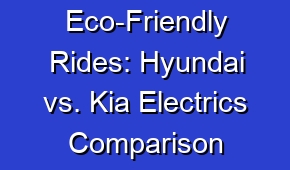Honda vs Hyundai: Top Eco-Friendly Cars Compared

Compare the top eco-friendly cars from Honda and Hyundai to make an informed choice. Discover the key features, performance, and sustainability of each brand’s electric and hybrid models. Find out which car suits your needs and contributes to a greener future.
When it comes to top eco-friendly cars, the battle between Honda and Hyundai is fierce. Both Honda and Hyundai have made significant strides in producing vehicles that are environmentally friendly and fuel-efficient. With their commitment to sustainability, these automakers are leading the way in the industry.
Honda has long been known for its dedication to eco-friendly technology. Their lineup includes popular models such as the Honda Civic and Honda Insight, which boast impressive fuel efficiency ratings. These vehicles utilize advanced hybrid technology, reducing emissions and minimizing their carbon footprint.
On the other hand, Hyundai has also made a name for itself in the eco-friendly car market with models like the Hyundai Ioniq and Hyundai Kona Electric. These vehicles offer all-electric or hybrid options, providing drivers with a greener alternative without compromising on performance.
Ultimately, the choice between Honda and Hyundai comes down to personal preference. Both automakers offer a range of eco-friendly options that cater to different needs and budgets. Whether you prioritize fuel efficiency or electric power, there is a top eco-friendly car from either Honda or Hyundai that will suit your needs.
| Honda and Hyundai offer top eco-friendly cars with impressive fuel efficiency. |
| Both Honda and Hyundai prioritize sustainability by incorporating advanced hybrid technology. |
| When it comes to eco-friendliness, Honda and Hyundai are leading the automotive industry. |
| Honda and Hyundai vehicles feature low emissions, making them environmentally friendly choices. |
| With their eco-friendly features, Honda and Hyundai cars contribute to a greener future. |
- The Honda Insight offers exceptional fuel efficiency without compromising performance.
- The Hyundai Ioniq Electric is an all-electric vehicle that produces zero emissions.
- Honda Clarity Plug-in Hybrid combines electric power with a gasoline engine for extended range.
- The Hyundai Kona Electric provides a long driving range on a single charge.
- Honda Accord Hybrid and Hyundai Sonata Hybrid offer hybrid powertrains for improved fuel economy.
What are the key features of eco-friendly cars?
Eco-friendly cars, such as the Honda and Hyundai models, come with several key features that make them environmentally friendly. These features include low or zero emissions, improved fuel efficiency, and the use of sustainable materials in their construction. Additionally, eco-friendly cars often incorporate advanced technologies like regenerative braking and hybrid or electric powertrains to further reduce their environmental impact.
| Reduced Emissions | Energy Efficiency | Renewable Fuel Sources |
| Eco-friendly cars produce fewer harmful emissions, such as carbon dioxide and nitrogen oxides. | These cars are designed to use energy more efficiently, resulting in lower fuel consumption and reduced environmental impact. | They can run on renewable fuel sources like electricity or hydrogen, reducing reliance on fossil fuels. |
| Improved Air Quality | Noise Reduction | Long-term Cost Savings |
| By emitting fewer pollutants, eco-friendly cars contribute to cleaner air and better overall air quality. | These vehicles are often quieter compared to traditional cars, reducing noise pollution in urban areas. | Although the initial cost may be higher, eco-friendly cars tend to have lower operating and maintenance costs in the long run. |
How do Honda and Hyundai prioritize sustainability in their car manufacturing?
Honda and Hyundai are both committed to prioritizing sustainability in their car manufacturing processes. They employ various strategies to achieve this, such as incorporating renewable energy sources in their production facilities, implementing recycling programs for materials used in manufacturing, and reducing waste generation throughout the production process. Both companies also invest in research and development to continuously improve the environmental performance of their vehicles.
- Honda prioritizes sustainability in their car manufacturing through the use of environmentally friendly materials. They incorporate recycled materials into their vehicles, reducing the need for new resources and minimizing waste.
- Hyundai focuses on sustainability by implementing eco-friendly production processes. They strive to reduce energy consumption and greenhouse gas emissions during the manufacturing phase, contributing to a cleaner and greener environment.
- Both Honda and Hyundai prioritize sustainability by investing in research and development of alternative energy sources. They are actively involved in the development of electric and hydrogen fuel cell vehicles, aiming to reduce reliance on fossil fuels and decrease carbon emissions.
Which Honda models are considered eco-friendly?
Honda offers several models that are considered eco-friendly, including the Honda Accord Hybrid, Honda Insight, and Honda Clarity Plug-In Hybrid. These vehicles utilize hybrid or plug-in hybrid powertrains, which combine an internal combustion engine with an electric motor to optimize fuel efficiency and reduce emissions. Honda’s commitment to eco-friendliness extends across their lineup, with many of their conventional gasoline-powered models also featuring technologies to enhance fuel efficiency.
- Honda Insight
- Honda Clarity Plug-In Hybrid
- Honda Accord Hybrid
- Honda CR-V Hybrid
- Honda Fit EV
Which Hyundai models are known for their eco-friendliness?
Hyundai has made significant strides in producing eco-friendly vehicles. Some of the notable models include the Hyundai Ioniq Electric, Hyundai Kona Electric, and Hyundai Sonata Hybrid. The Ioniq Electric and Kona Electric are fully electric vehicles, offering zero emissions and a long electric range. The Sonata Hybrid, on the other hand, combines a gasoline engine with an electric motor for improved fuel efficiency and reduced environmental impact.
| Hyundai Ioniq Electric | Hyundai Kona Electric | Hyundai Sonata Hybrid |
| The Hyundai Ioniq Electric is a fully electric vehicle with zero emissions. | The Hyundai Kona Electric is also a fully electric vehicle known for its eco-friendliness. | The Hyundai Sonata Hybrid combines a gasoline engine with an electric motor for improved fuel efficiency. |
| It offers a long electric range and is perfect for daily commutes. | It offers a good electric range and is suitable for both urban and long-distance driving. | It provides a smooth and efficient driving experience with reduced fuel consumption. |
What is the price range of eco-friendly Honda cars?
The price range of eco-friendly Honda cars varies depending on the model and trim level. Generally, hybrid models like the Honda Accord Hybrid and Honda Insight tend to be priced slightly higher than their conventional gasoline counterparts due to the additional technology and features they offer. However, it’s important to consider the long-term cost savings in terms of fuel efficiency and potential tax incentives or rebates that may be available for eco-friendly vehicles.
The price range of eco-friendly Honda cars varies depending on the model and features.
What is the price range of eco-friendly Hyundai cars?
Eco-friendly Hyundai cars are available at various price points to cater to different budgets. Fully electric models like the Hyundai Ioniq Electric and Hyundai Kona Electric generally have a higher starting price compared to hybrid models such as the Hyundai Sonata Hybrid. However, it’s important to consider factors such as long-term fuel savings, potential tax incentives, and maintenance costs when evaluating the overall value of an eco-friendly vehicle.
The price range of eco-friendly Hyundai cars varies depending on the model and features.
Which brand offers better warranty coverage for their eco-friendly cars: Honda or Hyundai?
Both Honda and Hyundai offer competitive warranty coverage for their eco-friendly cars. Honda typically provides a limited warranty that covers the vehicle for 3 years or 36,000 miles, whichever comes first. Additionally, their hybrid powertrain components are covered by an extended warranty of 8 years or 100,000 miles. Hyundai, on the other hand, offers a similar limited warranty of 5 years or 60,000 miles and an extended warranty of 10 years or 100,000 miles for hybrid and electric vehicle components. It’s recommended to review the specific warranty details for each model when making a purchasing decision.
Honda
Honda offers a comprehensive warranty package for their eco-friendly cars. They provide a 3-year/36,000-mile limited warranty, which covers any defects in materials or workmanship. Additionally, Honda offers a 5-year/60,000-mile powertrain warranty, which covers the engine and transmission. This warranty coverage gives customers peace of mind and shows Honda’s confidence in the durability and reliability of their eco-friendly vehicles.
Hyundai
Hyundai also offers a competitive warranty coverage for their eco-friendly cars. They provide a 5-year/60,000-mile new vehicle limited warranty, which covers any manufacturing defects. In addition, Hyundai offers a 10-year/100,000-mile powertrain warranty, which covers the engine and transmission. This extensive warranty coverage demonstrates Hyundai’s commitment to quality and customer satisfaction.
Comparison
When comparing the warranty coverage offered by Honda and Hyundai for their eco-friendly cars, both brands provide strong warranties. However, Honda offers a shorter limited warranty period of 3 years/36,000 miles compared to Hyundai’s 5 years/60,000 miles. On the other hand, Hyundai offers a longer powertrain warranty of 10 years/100,000 miles compared to Honda’s 5 years/60,000 miles. Therefore, the choice between the two brands would depend on the specific needs and preferences of the customer.



















